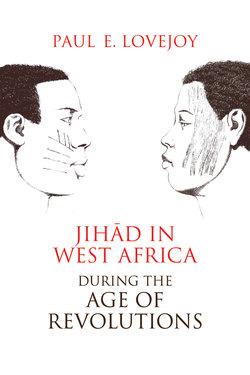Читать книгу Jihād in West Africa during the Age of Revolutions - Paul E. Lovejoy - Страница 10
На сайте Литреса книга снята с продажи.
ОглавлениеACKNOWLEDGMENTS
I owe a debt to various scholars, students, and former students with whom I have worked and published throughout my career. Without their enthusiastic involvement and intellectual interaction, my work would never have attained the level that it has. I specifically want to recognize the contributions of Steven Baier, with whom I first developed the argument relating to the desert-side economy of the Bilād al-Sūdān. Jan S. Hogendorn and I together recorded oral testimonies in Nigeria and analyzed British colonial policy on the slave societies of what became Northern Nigeria. David Tambo and Louise Lennihan were part of a team that copied many documents in the Nigerian National Archives in Kaduna, which have subsequently been digitized and cross-referenced to the digital collection made by Mohammed Bashir Salau, whose work on plantations in the Sokoto Caliphate has elaborated my early conceptions of plantation slavery in West Africa. Sydney Kanya-Forstner and I undertook several projects that inform this book, including the study of the conquest of the Sokoto Caliphate, French policy on slavery, and the travels and impact of Ahmad el-Fellati ibn Dauda ibn Muhammad Manga. Yacine Daddi Addoun and I studied the life and works of Muhammad Kabā Saghanughu, as well as the Katsina merchant Ahmad Abu al-Ghaith and the account of Islam in Brazil of ʿAbd al-Rahman al-Baghdadi. Jennifer Lofkrantz and I worked on Islamic law and commerce in West Africa. Jamie Bruce Lockhart and I published an annotated version of the journals of the second expedition of British diplomat Hugh Clapperton, whose accounts of Oyo, Sokoto, and Borno in the 1820s are crucial in understanding the jihād. I first undertook the study of the life of Mahommah Gardo Baquaqua with Robin Law and have continued it with Bruno Véras and Danielle Brouwer. Various people have helped with the oral data that underlie the study of slavery in the Sokoto Caliphate, including Mohammed Bashir Salau, Ibrahim Hamza, Saude Hamza, and of course the various students and research assistants who were involved in the collection of oral interviews when I was a lecturer at Ahmadu Bello University in Nigeria. David V. Trotman and I analyzed the Muslim immigrants to Trinidad in the early nineteenth century and by extension developed the idea that the experiences of individuals in Africa shaped their responses to enslavement and emancipation in the Americas. Moreover, over the years I have benefited from extensive intellectual interaction with Martin A. Klein, Ann O’Hear, M. B. Duffill, Toyin Falola, Boubacar Barry, Suzanne Schwarz, David Richardson, and Bruce Mouser and more recently with Benedetta Rossi, Manuel Barcia, Ibrahima Seck, and Gwendolyn Midlo Hall. Carlos da Silva Jr., Neilson Bezerra, Myriam Cottias, Elaine Moreira, Mariana Candido, Feisal Farah, Henry B. Lovejoy, Jennifer Lofkrantz, Vanessa Oliveira, Olatunji Ojo, Tim Soriano, Bruno Véras, and Katrina Keefer have also assisted in various ways and therefore require an expression of my appreciation. Various colleagues have commented on all or portions of the manuscript, including Yacine Daddi Addoun, Michael La Rue, Bruno Veras, Bruce Mouser, Jennifer Lofkrantz, and Sean Kelley. David Eltis has helped me in many ways, often challenging me to refine my arguments, and especially through his patience in deciphering the Voyage Database. Yacine Daddi Addoun corrected the Arabic. Henry Lovejoy deserves additional recognition for constructing the maps for this study and providing essential feedback on the Yoruba dimension. Charles Eberline undertook the painstaking task of copy editing the manuscript, for which I am grateful.
Various aspects of my arguments in this book have been presented at conferences too numerous to list, as well as in many publications that are identified in the introduction. I fully acknowledge this lengthy progression of my thoughts that have been shaped over the years since I conducted my Ph.D. research in Nigeria in 1969–70 and subsequently developed my thoughts while I was teaching at Ahmadu Bello University in 1974–76. The Social Sciences and Humanities Research Council of Canada has provided generous funding for my research over the years. Moreover, the research for this project was completed under the auspices of the Canada Research Chair in African Diaspora History. The need to discuss the issue of jihād in the context of the Atlantic world and the contemporary political scene derives from numerous conversations I have had with Rina Cáceres Gómez, to whom this book is dedicated.
